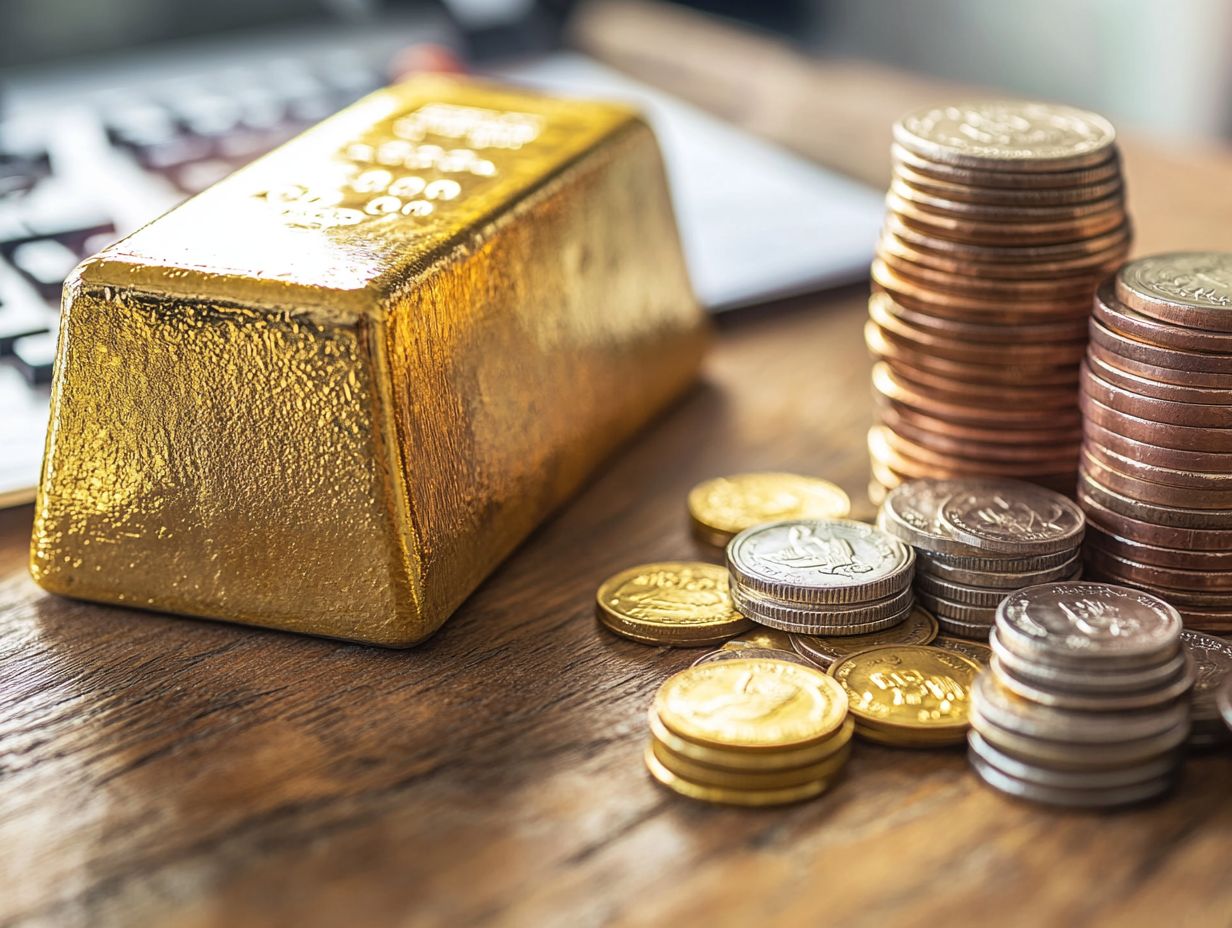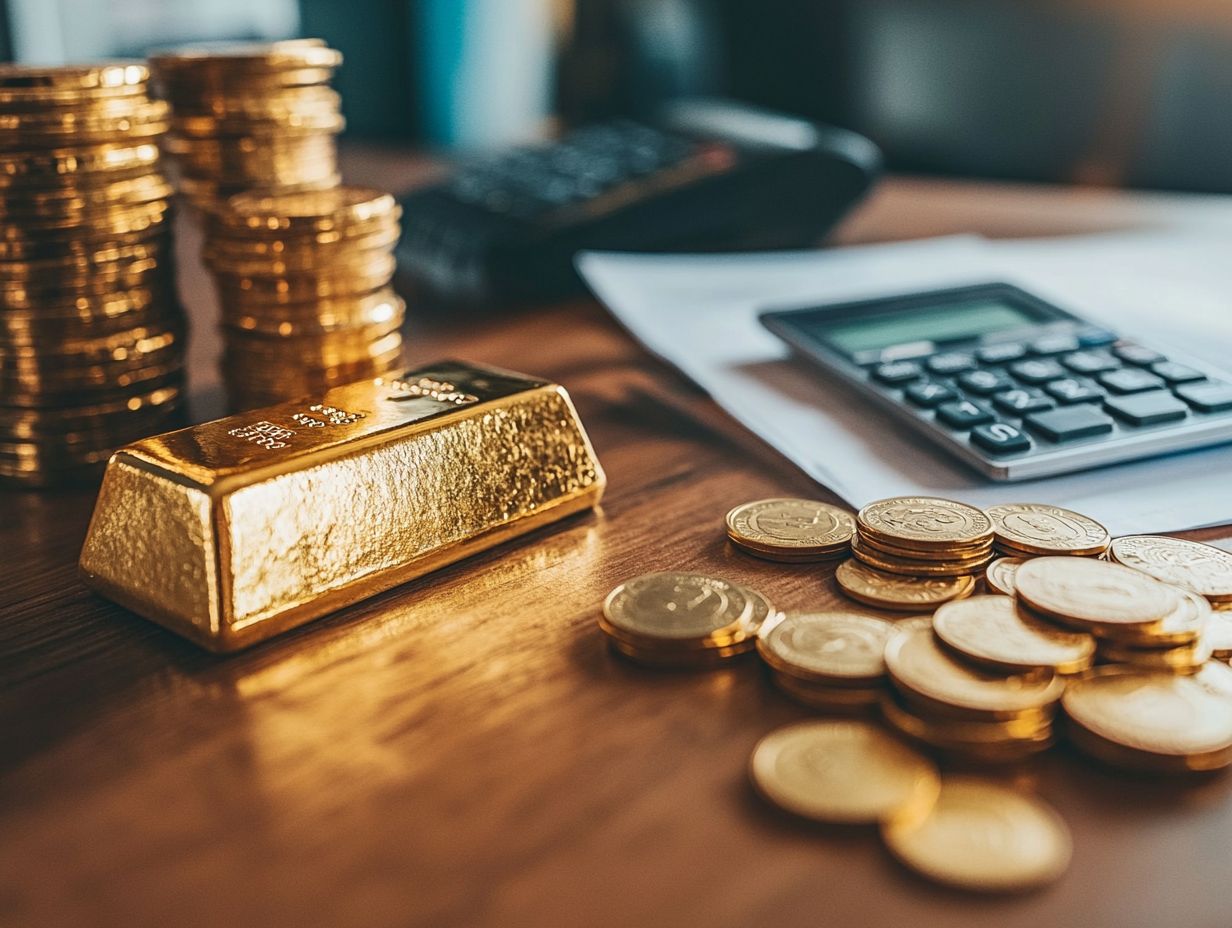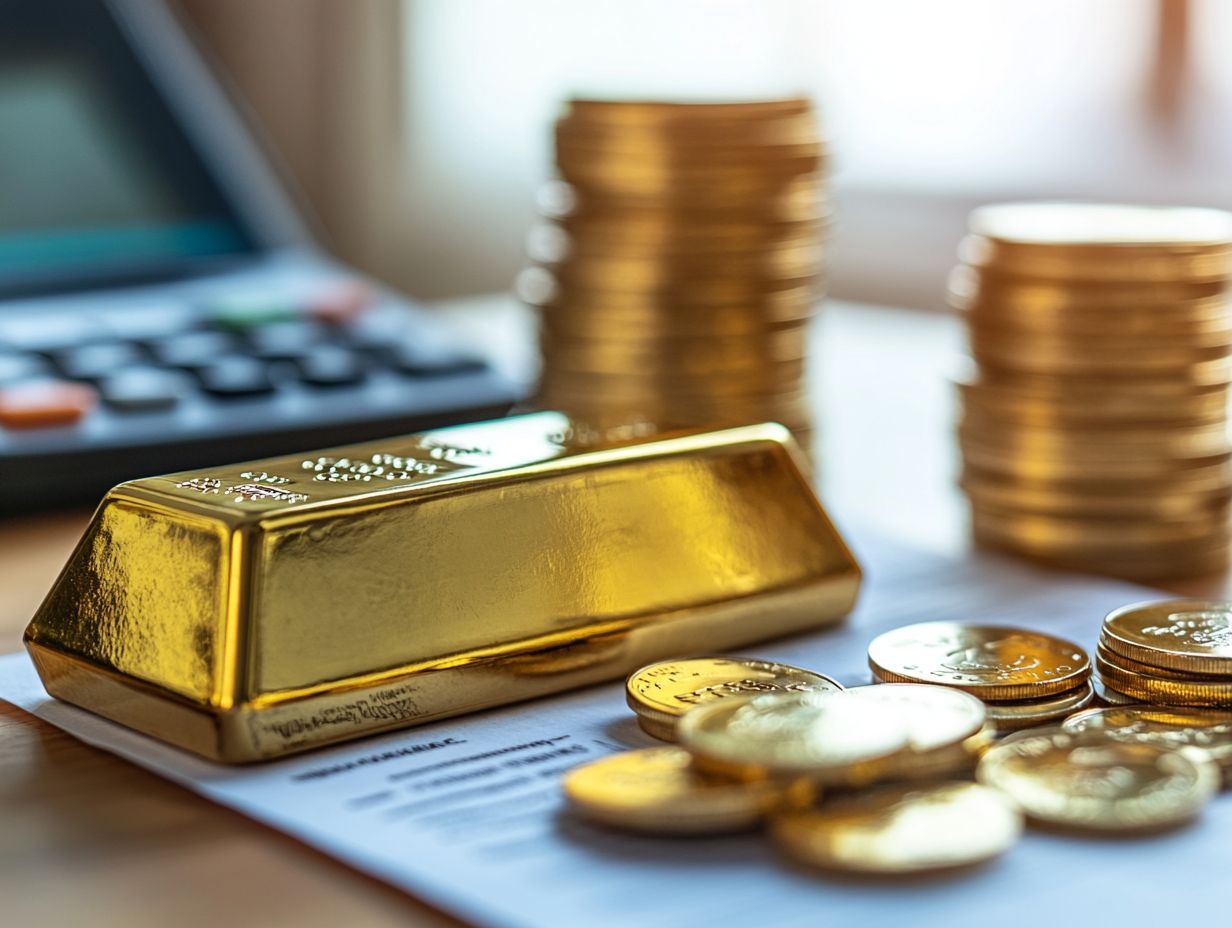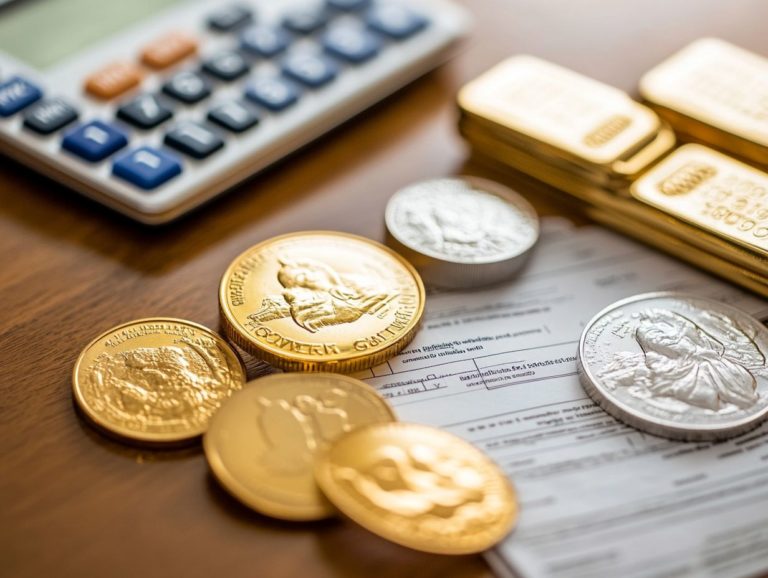Tax Implications of Trading Precious Metals in the Market
Navigating the world of precious metals trading can be both rewarding and complex, particularly when it comes to understanding tax implications.
This article unravels the intricate landscape of taxation for gold, silver, platinum, and other metals. You ll discover the specific tax laws and regulations that govern your trading activities. Additionally, effective methods for calculating taxes will be highlighted.
This knowledge will empower you whether you re an individual trader, a business entity, or an astute investor to maximize benefits while minimizing liabilities.
We ll also address crucial reporting requirements to ensure your compliance, all while optimizing your investments. Jump in now to discover how you can protect and grow your investments!
Contents
- Key Takeaways:
- Taxation of Precious Metals Trading
- Types of Precious Metals Taxed
- Calculating Taxes on Precious Metals
- Tax Implications for Different Types of Traders
- Maximizing Tax Benefits for Precious Metals Trading
- Reporting Precious Metals Trading on Tax Returns
- Frequently Asked Questions
- What are the tax implications of trading precious metals in the market?
- Do I have to pay taxes on profits from trading precious metals?
- What is the difference between short-term and long-term capital gains taxes on precious metals?
- Are there any tax breaks or deductions for trading precious metals?
- Do I have to pay taxes on precious metals that I hold physically?
- What happens if I trade precious metals in a tax-deferred account?
Key Takeaways:

- Precious metals trading is subject to taxation, and traders should be aware of the relevant laws and regulations.
- Gold, silver, platinum, and other metals are typically taxed differently. Traders should understand the calculation methods.
- Individuals, businesses, and investors may face different tax implications for their precious metals trading activities. Effective tax strategies can help minimize liability.
Taxation of Precious Metals Trading
Taxation of precious metals trading presents a complex landscape that profoundly influences market participants. This is especially true for investors involved in trading assets such as physical gold, silver coins, and platinum.
Understanding these tax implications is crucial for your financial success! It s important to grasp the tax paid on profits from selling assets and the relevant IRS regulations. Doing so is key to devising effective investment strategies.
Amidst rising economic uncertainty, the necessity for meticulous tax planning becomes increasingly evident. This planning directly impacts the financial growth of individuals and businesses with investment portfolios that include these valuable assets.
Overview of Tax Laws and Regulations
The landscape of tax laws and regulations surrounding precious metals trading is intricate. It often mirrors the rules for collectibles and stock trading.
You need a keen understanding of the IRS guidelines that apply to these assets. As an investor in gold, silver, platinum, and other precious metals, it s crucial to be aware of how the IRS classifies these assets as collectibles.
This classification significantly affects how capital gains taxes are applied. If you sell precious metals held for more than a year, the tax treatment differs from that of short-term trades.
Long-term gains are generally taxed at a maximum rate of 28%, while short-term gains fall under ordinary income tax rates. There are also strict reporting requirements that you must navigate. Failure to accurately report trades can result in penalties. Understanding these nuances is essential if you want to profit from investing in precious metals.
Types of Precious Metals Taxed
The IRS primarily taxes precious metals such as gold, silver, and platinum. These metals are classified as collectibles, which brings specific capital gains tax implications that you need to grasp in order to manage your investment portfolio effectively.
Understanding these tax nuances is essential for optimizing your financial strategies.
Gold, Silver, Platinum, and Other Metals
Gold, silver, platinum, and other precious metals can be invaluable assets in your investment portfolio. Understanding their market value and tax implications is key for informed investing and effectively managing potential capital gains tax liabilities.
These metals not only act as a safeguard against inflation and economic uncertainty, but they also come with distinct tax considerations. For instance, gold and silver are often classified as collectibles under tax laws. This means any profits from their sale may be subject to elevated capital gains tax rates, typically capped at 28%.
Platinum, with its own unique market dynamics and tax treatment, requires you to stay informed about pricing trends and regulatory shifts. The multifaceted roles these metals play in both personal finance and broader market strategies underscore the necessity of comprehensive knowledge when it comes to investing.
Calculating Taxes on Precious Metals

Calculating taxes on precious metals requires specific methods and formulas that adhere to IRS regulations. This process influences both short-term and long-term capital gains, shaping your investment returns.
Let s dive into the methods for calculating taxes effectively.
Methods and Formulas for Calculating Taxes
When calculating taxes on precious metals, you need to use established methods and formulas that account for capital gains taxes and comply with IRS regulations governing capital assets.
This involves understanding the difference between capital gains (profits earned from selling an asset) from the sale of these assets and knowing the tax implications based on how long you’ve owned them. Start by determining whether your gains are short-term assets held for one year or less or long-term, which means you ve held them for more than a year.
Keep in mind that short-term gains are taxed at ordinary income rates, which can be steep, while long-term gains enjoy more favorable rates, typically ranging from 0% to 20% depending on your taxable income. Understanding this difference streamlines your tax calculations and enhances your overall investment strategy.
Tax Implications for Different Types of Traders
Tax implications vary considerably for different trader types. As an individual, business, or investor, you navigate distinct IRS regulations and capital gains tax structures, which depend on your specific trading activities and asset classifications.
Individuals, Businesses, and Investors
As either an individual, a business, or an investor, you encounter unique tax implications tied to your trading strategies. It s essential to understand the IRS guidelines that govern your specific activities in the financial markets.
For example, as an individual, you may face capital gains taxes that hinge on how long you hold your assets. Businesses might qualify for various tax treatments based on their corporate structure and trading frequency. Institutional investors have their own complexities, often involving the high volume of transactions and potential tax-exempt status on certain investments.
The nuances between diverse trading strategies, such as active day trading versus long-term investing, can create significantly different tax liabilities. That s why tailored tax advice from financial advisors is crucial; it helps you navigate these intricacies, maximizing your financial benefits while ensuring compliance with tax regulations.
Maximizing Tax Benefits for Precious Metals Trading
To maximize tax benefits from precious metals trading, engage in strategic planning and develop a comprehensive understanding of the options available for minimizing tax liability. Consulting with a financial advisor can help you navigate the intricate landscape of capital gains taxes.
Strategies for Reducing Tax Liability

Implementing effective strategies to reduce your tax liability can significantly enhance the financial returns from your precious metals trading. By leveraging IRS guidelines, you can maximize available tax breaks and minimize capital gains taxes.
Consider the timing of your asset liquidation as a crucial strategy. By strategically deciding when to sell your metals, you can minimize your taxable income. For instance, waiting until you qualify for long-term capital gains treatment can lead to tax rates as low as 15% compared to 37% for short-term gains. Additionally, it’s important to understand the tax implications of precious metals trading to make informed decisions.
Utilizing tax exemptions, such as those available for retirement accounts like IRAs, can offer significant advantages. Experts frequently recommend combining these techniques with diversified investment strategies that align with current capital gains tax regulations, ensuring that every investment decision is both financially sound and tax-efficient.
Don t miss out on the opportunity to optimize your taxes! Consult a tax professional to ensure you re taking full advantage of available strategies.
Reporting Precious Metals Trading on Tax Returns
Reporting precious metals trading on your tax returns is essential for following IRS guidelines. Ensure all transactions are documented, and you may need to complete Form 1099-B to report your profits and losses accurately.
Filing Requirements and Important Considerations
Understanding filing requirements is crucial and can feel overwhelming, but it’s vital to get it right! You need to grasp the role of Form 1099-B and key considerations for IRS compliance.
When trading metals like gold or silver, pay attention to what counts as reportable transactions. Typically, you’ll receive Form 1099-B from your brokers based on your trading volume and the types of metals involved.
Keeping detailed records is vital. Track your acquisition costs, sale prices, and transaction dates for accurate reporting. Remember, different deadlines apply for submitting Form 1099-B and other tax documents, so staying organized is key.
Be aware that state tax laws may complicate your reporting process, as these can differ significantly by location.
Frequently Asked Questions
Here are some frequently asked questions about trading precious metals and taxes.
What are the tax implications of trading precious metals in the market?
The tax implications depend on the type of metal traded, how long you’ve held it, and the tax laws in your area. It’s best to consult a tax professional for personalized advice.
Do I have to pay taxes on profits from trading precious metals?

Yes, profits from trading precious metals are generally subject to taxes. The specific tax rate will depend on your income bracket and how long you’ve held the investment.
What is the difference between short-term and long-term capital gains taxes on precious metals?
Short-term capital gains taxes apply to profits from trading precious metals held for less than one year. Long-term capital gains taxes apply to profits from those held for more than one year.
Are there any tax breaks or deductions for trading precious metals?
In some cases, investors may qualify for certain tax breaks or deductions related to trading precious metals, such as deducting losses from other investments. Again, it’s important to consult a tax professional for personalized advice.
Do I have to pay taxes on precious metals that I hold physically?
If you hold physical precious metals, like gold or silver coins, you may not face taxes until you sell them. However, check your local tax laws, as they may vary.
What happens if I trade precious metals in a tax-deferred account?
If you trade precious metals in a tax-deferred account, such as an IRA or 401(k), you usually won’t have to pay taxes on the profits until you withdraw funds. Early withdrawals may incur penalties and taxes, so consult a tax professional for advice.
Stay informed and consult with a tax professional to maximize your benefits and avoid pitfalls.












